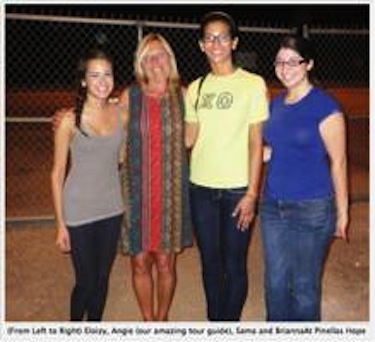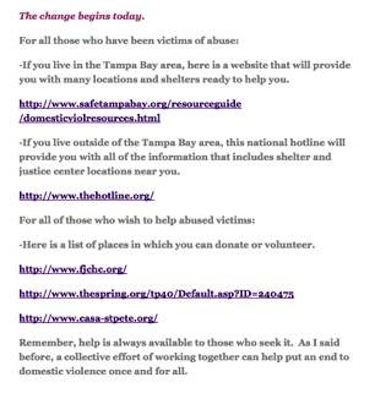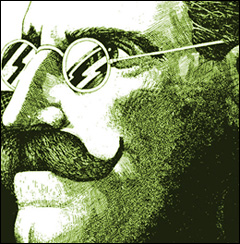The Artifacts
For the final project of the FYC sequence, Rhetoric in Action, I asked students to create a group blog that served to address a pressing social issue in the local, state, or national area, keeping in line with Dewey’s idea that collective experience is key to making changes in the polis. The blog assignment, which will be outlined in detail in this section, is cast as a resource and argumentative space for the students to create and thus as a challenge to the genre and exigencies typically associated with blog use. Students were asked not to join an existing community but to create one of their own – one that is represented by the creation of a blog that serves as a valuable educational, argumentative, and participatory resources for those also interested in the social issue.
The Set-Up
I must begin with a caveat: the blogs I had my students create were not “typical.” They were not used as web spaces containing periodical posts about a given topic. They were used as (relatively) static spaces that presented contextual information, supporting argumentation, and personal experience on a social issue of the group’s choice in the local Tampa Bay area. Blogging sites were used for multiple reasons: a) the students had been informally blogging all semester on their own class blogs and were accustomed to the technology; b) teaching students how to use Wordpress is exponentially less time consuming than having students use HTML, Google Sites, or even other web creation sites like Wix. FYC courses have certain limitations in terms of technical expertise required so being able to use familiar technologies is much more productive. As Lowe (2005) points out, blogs are good alternatives to HTML pages and other methods because it allows students focus more on the text than the visual design over which they would have ultimate control. Although I was using blogs in ways that completely defied the genre constraints and rhetorical exigencies of blogs, I found that this fits very nicely with Dewey’s conceptualization of how we use technological artifacts. Says the authority on Dewey, specifically Dewey’s critique of technology:
The major feature of Dewey’s technological landscape is his contention that what lies beyond theory and practice, and what allows them to have commerce with one another, is the production of testable artifacts, among which he includes both those things popularly called ‘mental’ and those popularly called ‘physical.’ Dewey’s critique of technology is above all a critique of the production of novel and testable artifacts… Technology may thus be thought of as a family of methods and tools that evolves in response to the needs and goals that it is called upon to serve, and in response to the uses to which it is put …[M]ajor advances in productive skills had been achieved as a result of the expanded use of instrumentation that was an essential part of the rise of modern science and industry ” (Hickman, 1990, p. xi).
My experience with blogs was a non-typical one, but, just like any technological artifact, its use-value is based upon the ability one has adjust its use for a particular purpose. During this time, I needed a highly-usable platform that I could use for students to craft their digital space. What would ideally have been a project best served by a Google Site or even an HTML site, I was able to use blogs as static spaces for students to present bodies of research and well-reasoned information. This was a significant part of the “stretching” process for the use of blogs. Having used blogs many times in previous classrooms, I understand that blogs, as artifactual tools, can be re-fashioned for a variety of different purposes: course blogs can serve as discussion boards that meet the requirements of an “online writing” component of the grade. Individual blogs can serve as personalized spaces through which students can reflect on various course or life experiences. Place-based blogs can encourage students to experiment with different writing styles as each post is written in a different physical location. Professional blogs can teach students how to build online ethos and network with individuals in their intended field. Group blogs can be an online component of a major project in which several groups share a blog and provide varied voices for a shared purpose, teaching the importance of collaborative writing. Blogs, like any digital artifact (or literacy tool), are bursting with rhetorical potential, and their high degree of amateur usability makes blogs an appealing artifact for teaching digital literacy to first-year students.
The subtitle of the third and final project of ENC 1102 at USF is in the form of a straightforward but absolutely loaded question: “How Do Arguments Become Action”?(>>) Each instructor of course could give their own individual presentation of the project, largely determined by their experiences with technology, their politics, and their definitions of “social action.” For myself, I really struggled with thinking about how to formulate the project, largely because I was forced to think through what exactly constituted “social action,” resisting the temptation to follow the New London Group and Henry Jenkins’ calling to cast digital participation as enacting democratic principles. My formulation of the project was admittedly informed by my tendency to quietly rally against forms of cyber-utopianism that have begun to manifest themselves in the field of rhetoric and composition. Evgeni Morozov (2011) has recently referred to cyber-utopianism as a “naïve belief in the emancipatory nature of online communication that rests on a stubborn refusal to acknowledge its downside.” The notion that writing “publicly” online constituted social action and was an act of citizenship seemed a bit misleading. But at the same time, I did not have the institutional resources at my disposal to develop any sort of organized service-learning initiative that would have students engage in a more structured face-to-face form of rhetorical action.
Students enrolled in the course were blogging regularly throughout the duration of the semester. My goals were not idealistic: whether I assigned the prompt or gave them a “write whatever” prompt, the students were very much aware that blogs are individualized spaces in which writers can share their thoughts in an online public way. Over the course of the semester, the students became increasingly comfortable using Wordpress as their go-to site for completing the informal writing component of their grade, so much so that a few of them even began experimenting with the aesthetic nature of the blog. Some students were beginning to treat it like an open canvas that should readily exhibit their personality and interests in both form and content. I see this is the result of Ruth Reynard’s (2005) belief that blogs need to be integrated early on into the course content or else it just turns into busywork.
Here is a snippet from the project description:
In the first two ENC 1102 projects, you learned about rhetorical strategies of argumentation (Project One) and how to consider various differing views on a particular controversial topic (Project Two). In Project Three, you will lean on this knowledge to help you research a topic of personal and social significance and then argue for change. There are a wide variety of topics that you could write about; ask yourself what in the world needs changing, perhaps on a local, global, political, or social level. Your job is to convince your readers of the importance of your chosen topic and motivate them to enact change by offering a well-researched and persuasive argument. It’s not enough, however, to argue for a change; this project will also ask you to participate in enacting some sort of change. This project asks you to organize yourselves into groups of 3 or 4 students and choose a university, local, national, or global issue that requires social action and that you deem is a worthy cause.
In addition to the essay, you actually have to perform on of your recommended action as a group. This may take the form of a letter to a government representative, a persuasive online video, a podcast, a work of art, a stand outside on campus, or even through a few hours volunteering. Other examples of possibilities and local organizations will be discussed in class but ultimately the group will have to choose the appropriate organization and subsequent group action. All members will engage brief reflections as first-person accounts about this social action experience.
Essentially, I caved: I allowed online social action to exist on an equal level with physical social action. The students responded to this prompt in many different ways, ranging from simply creating Facebook pages to picketing outside the local greyhound racing track to collecting, donating, and visiting the local domestic abuse shelter. That being said, many groups chose not to enact their social action online. Rather, they opted to go out into the local community and share a physical interaction with a social issue they deemed was worthy of attention, in essence honing their ability in the Deweyan sense to develop a sense of the community’s “felt needs.”
There were essentially four components to the blog that each group needed to fulfill in order to complete the assignment: Background (contextual information on the social issue), Their Perspective (provide substantial arguments for the significance), Opposing Views (arguments against the cause), Take Action (discuss their social action experience and provide resources for other to do the same). Most groups divided these sections into headers (Figure 1).
![]()
Figure 1: Typical header.
The information on each page was static and was aimed at providing a socially-responsible webspace that provided multiple perspectives and also created ethos by outlining their own experience. The importance of experience to Dewey’s philosophy cannot be understated here. Actual physical experience with an object or idea is the basis upon which philosophy should be founded and the notion against which all ideas should be measured. In this respect, the blogging assignment at USF asks students to actually perform a social action in the community and use it as the basis for the information on their blog; this is not to say that digital interactions do not constitute experience, but rather that tools reshaped and produced from more democratic experience will tend to lead to more experiences and understanding towards similar experiences. That way, communication is based upon actual physical experience with the materiality of their social issue. Social bonds can be technological but not only technological because they are lacking the material experience of humans in physical environments (Figure 2). Technological community is not sufficient: in this formulation, students need to actually go out in the community and share web presence there. Simply put, not merely just blogging about experience (Heilker, p.73), but rather blogging because of an experience.



Figure 2: Community “experiences” vary, from collecting and supplying materials for the local domestic abuse shelter (upper left), to presenting materials in the school’s student center (upper right), to volunteering at a homeless shelter (bottom).
Time constraints and technical skills restricted the students from actually forming websites for the final project. It was in the midst of this that I realized that blogs, traditionally associated with first-person narrative accounts or even collaborative pieces, took the form of something else. I began to think about the impact this had on students, particularly their understanding of the rhetorical exigencies of blogs. What began as an instance of convenience, of essentially teaching my students how to blog “improperly,” ultimately turned into an opportunity to challenge the rhetorical purpose(s) of these web spaces and the implications educational blogging can have on student perceptions of pedagogy. The rhetorical exigencies of blogs have been challenged before. Grafton (2009) relates her experience in blogging about a certain event, making blogs represent the individual and social elements of rhetorical exigencies. In her discussion, blogs started out of a physical experience with the community but also involved the insertion of the private voice into the public sphere (Some students added pictures and descriptions of themselves to associate themselves with the cause.)
The one commonality that my students’ blogs had with typical blog usage was the amount of links, or resources, they provided. In addition to informing their audience, arguing their position, acknowledging the counter-arguments, and tracing their experience, they were required to post “pathways for practice,” which were essentially resources, links, or ideas they thought of to help people assist in the cause (Figure 3).

Figure 3: By doing this, students are using their own “personalized” spaces as a researched springboard for action for those interested or who have experienced similar “felt needs” towards the issue.
Technically speaking, this project, while falling under the rubric of service learning, was in fact not. The students were not completing any tasks for any organization. For Dewey, students need not necessarily be responding to social situations through institutional forces. Student responses need to be more natural and contingent upon individual experiences and the needs of the community. In this framework, blogs become tools for social change and not self-presentation. There is a large injustice in having students’ experiences become formed by the community within which they were raised and then neglect that community when they acquire the very skills to improve it.
As teachers, our role becomes clear then: provide students with the opportunity for experience that extends beyond but work in conjunction with virtual connections. This is not service learning, and it is not an internship: this is an ethical – group or individual – obligation that extends beyond the institutional frameworks constituting typical student experience. In the Deweyan ethic, teachers have an obligation to provide students with an opening in which students can integrate previous experience. In my case, I placed students into groups based upon previous experience with social issues. Beyond this, teachers have an obligation to make explicit connections between students’ previous experiences and current experiences and make these two connect in socially meaningful ways. Making previous experiences meaningfully contribute to the community is the ethical responsibility of educational institutions and thus teachers in a democratic society. The teacher needs to appropriately frame the way in which continuity and interaction relate to each other.
